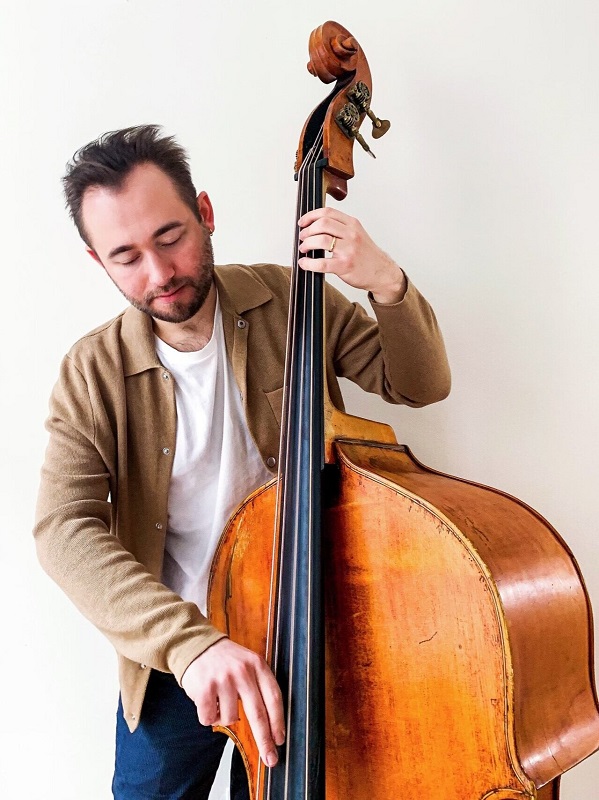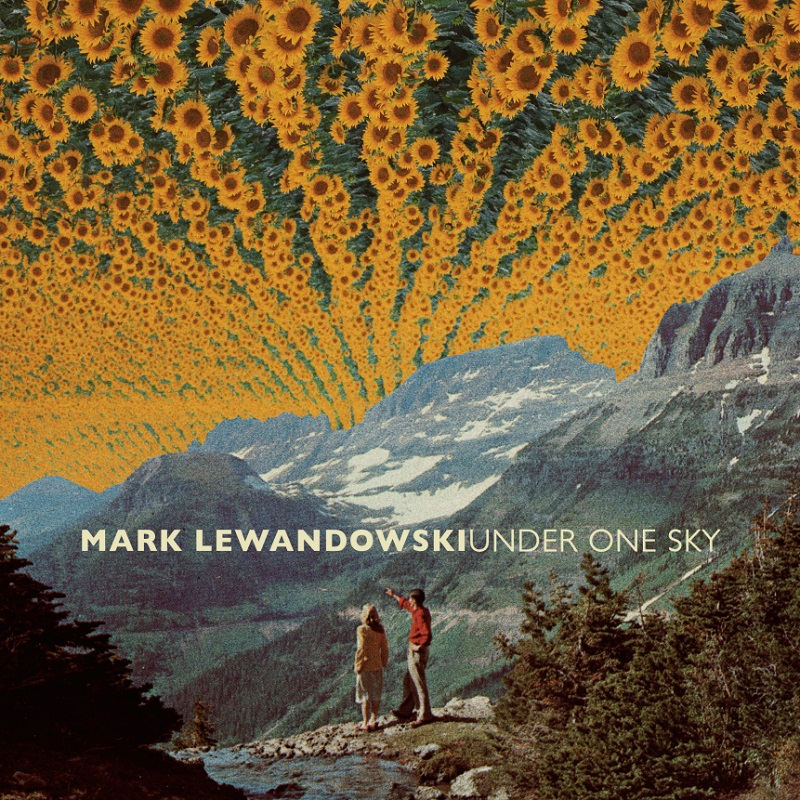Bassist Mark Lewandowski originally hails from Nottingham, England, but moved to New York City in August of 2017. In 2021, he released his second album as a leader Under One Sky with Addison Frei (piano) and Kush Abadey (drums). Writer Akira Saito had the opportunity to interview Mr. Lewandowski about his work and perspectives on the music.
Akira Saito (AS): What have you learned from Mr. Henry Grimes (and any impressive concerts which you have accompanied with him and Mrs. Margarette Grimes)?
Mark Lewandowski (ML): Henry Grimes is my musical hero. I met him in London at an amazing venue called Cafe Oto, where he was playing with Marc Ribot. I had a wonderful relationship with him studying, talking and hanging out. He taught me about openness to music (remember he played with everyone from Benny Goodman to Albert Ayler). Especially he taught me about sound. He was a real link to all the great musicians who all loved him for his personal approach to playing the bass. We shared many happy moments playing at his apartment and out on the scene. He and his wife, Margaret would always be out of the house, checking out music, sitting in and giving encouragement to younger musicians. They were like surrogate grandparents to me – when I arrived in New York with just my bass and my suitcase, they came all the way to the airport to meet me and take me to where I was staying! Of course there were many impressive nights out, but one thing I’ll always remember is when we were in clubs, the musicians would always acknowledge his presence. I remember going to hear Roy Haynes with him at the Blue Note in New York. Roy stood up, picked up the microphone and said ‘Ladies and Gentlemen, we have to acknowledge a great master in the audience tonight – Henry Grimes’. I remember visiting Cecil Taylor in hospital with Henry a few years ago. Cecil was lying in bed, facing the wall. As we walked in the room, without even turning around or seeing us, Cecil said ‘The day my father died, I asked you to join my band, Henry Grimes.’ He felt his presence and knew he was there without seeing him. That’s how deep these musicians were and the strength of their connections. I really miss Henry now he’s gone, but I have great memories and of course all the recordings to remind me about how wonderful a man and musician he was.
AS: What’s the difference between the London and NYC music scenes?
ML: Firstly it’s important for me to say that both London and New York are amazingly important ‘jazz cities’. Their contributions to the history, development and maintenance of the art form are both significant. I feel lucky to have worked with musicians both up and coming and established in both cities that have strongly affected my approach to playing and composing. This album, ‘Under One Sky’ is my tribute to how both places have influenced me. The music is my expression of how I feel an idea of location and identity are important to the improvising musician. London has a wonderfully diverse and creative jazz scene – plenty of places to play, brilliant and individual musicians and a strong educational system. New York has such a vibrancy and energy that it’s impossible not to get swept away by all these amazing musicians being gathered in one place. I can go out any night of the week and hear the worlds greatest musicians and the living masters. It’s always been my dream to move to New York, since I started to play and I’m so glad, and honored that my life has taken me that way. It’s a very difficult place to live, but for me the sacrifices musicians have to make are worth it – certainly at this stage in my life. The cities have different musical identities however. I think the very fact that New York is in America, makes the blues more prominent in the music here. As wonderfully creative and rich as the music is here, it’s still a bebop town. People value the art of swinging. There’s no substitute for that urgency in the music in New York, especially in the drummers. One thing I miss about London is the artistry of the composers there. The music is deeply personal and the sense of identity that the musicians have coming from their British (and many other) backgrounds is audible in the music. People really care about the craft of composition in London. I’ve tried to balance these different elements in this new record as I explore my identity as a British musician living in New York. Of course I miss London all the time – especially my friends, the beauty of the city and the amazing Turkish food!
AS: Your tunes dedicated to Paul Bley and Andrew Hill are fantastic and reminds me of both maestro pianists’ characteristics. Any comments?
ML: I have a deep respect and reverence for the musicians to come before me. Paul Bley and Andrew Hill embody the creative spirit – taking a blues heavy, bebop inspired music and pushing it forward. They’re part of the lineage of the piano and have a wealth of history in their playing, however modern they might sound. I’m trying to do the same with the bass, although I’ve always been drawn to pianists. If I played another instrument well, it’d be the piano. I love the ability a pianist has to accompany themselves, in fact I’m envious of that. Paul Bley and Andrew Hill’s music is cyclical. They value the importance of composition, and motifs from the written music flow throughout their improvisations. I’ve taken inspiration from them when writing my music – various themes and passages weave all the way through the compositions. I like the stillness they can conjure, even when the music is busy. Lots of poise, ringing notes and this flow which reminds me of water. They’re impressionistic in their approach to writing and improvising and I find their music very visual. The care these older musicians take in the craftsmanship of making music is deeply inspirational. Recently I’ve had the chance to work separately with two living masters, the great drummer Joe Chambers, and the great saxophonist Dave Liebman. Similarly, the level of detail, concentration and care they take in the whole process of making music has been incredibly inspiring to me as a young musician.
AS: What have you focused on during Covid-19?
ML: Well, the unique thing about this awful pandemic is that it’s affected every human being on the planet. I don’t like to cry about how awful a time it’s been, because compared to the suffering of so many others, it’s not been so bad. Of course losing all of my work, livelihood and social interactions has been very difficult. I’m proud to have stayed in New York throughout the whole thing, and in my small way, I’ve been here as part of the effort to restart the music scene. I’ve grown incredibly close with some friends and colleagues who I didn’t know well before. I hope that when things return to normalcy there will be something of a renaissance in the music. I hope that people will value artists more, and see the importance of music and art in general in a social environment. I’ve been lucky to have this new album to work on during this time. For this record I’ve tried to do everything myself without the help of a label. I was initially inspired by musicians like Jason Moran and Dave Douglas, who have been releasing material on Bandcamp, connecting directly with their listeners and trying to make the gap between musician and audience smaller. It’s been a huge learning experience, but I couldn’t be happier with the results. I have amazing colleagues in Addison Frei and Kush Abadey, who have devoted a lot of care, attention and love to the album. I thank them for this.
(This interview was originally made for JazzTokyo.)


